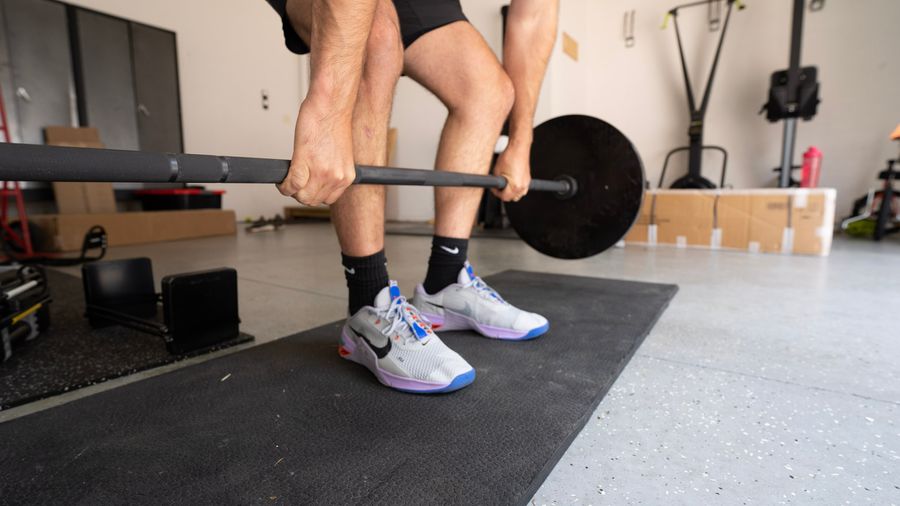We test and review fitness products based on an independent, multi-point methodology. If you use our links to purchase something, we may earn a commission. Read our disclosures.
Two-a-day workouts are common among high-level athletes training for a specific sport or event. On the other hand, some of us barely have enough time for one workout, let alone two, in a day.
But don’t write off that second session just yet! Working out twice a day can have its benefits, as long as you plan your training sessions strategically and safely and ensure adequate recovery.
As a certified personal trainer myself, I know that bodybuilders, marathoners, and everyone in between can see an improvement in their performance and overall wellness by adding a second workout to their routine, but only if done smartly. It’s helpful to know just what you’re getting into so you can be prepared to make the most of your increased training volume.
This article will review much of what you need to know before adding two-a-day workouts to your fitness schedule.
Is Working Out Twice a Day Safe?
Yes, working out twice a day can be perfectly safe if you follow a well-structured program and schedule adequate rest between your workouts. Rest is key after intense exercise to help prevent burnout and injury.
A day with double training sessions can look different between athletes. Two-a-days can include anything from mileage runs to high-intensity interval training (HIIT), restorative yoga to weightlifting, cycling to bodyweight exercises, and more. No matter what you choose to do, you can set yourself up for success by listening to your body’s needs between workouts.
RELATED: HIIT Bike Workouts

“Working out twice a day can be a great way to get more out of every minute you’re in the gym because you can have a more narrow focus on each session,” says Jacob Penner, USA Weightlifting Level 1 Coach, NCSA certified personal trainer, and CrossFit Level 1 Trainer.
“For example, you can break up the strength portion of your workout to do in the morning, and train a conditioning portion later in the day,” he explains. “This gives you the ability to potentially go harder in each session without worrying about one affecting the other. However, this is breaking up a long session into two. Doing two full sessions in one day is something most people should progress to, because for most, the sudden increase in volume can result in injury or, at the very least, it could hurt your performance in following sessions.”
You put in the hard work, hitting your reps and cranking out your cardio, and are strategic about your two-a-day training, but your investment in your fitness goals doesn’t stop when you leave the gym or hang up your running shoes for the day. It’s essential to provide your body with the tools to refuel and repair broken-down muscles. Muscle protein synthesis relies on proper nutrition, hydration, and adequate sleep during your recovery period.
RELATED: How to Choose Running Shoes
Benefits of Working Out Twice a Day
If done correctly, two-a-days can bring a lot to the table. Increasing your training volume stimulates physical adaptations that can enhance your athletic performance and fitness while benefiting your overall health.
Increased Daily Activity
One of the most obvious benefits of working out twice a day is that you’re moving more. Research has shown a connection between chronic medical conditions and a sedentary lifestyle, so moving your body even a few extra minutes each day can make a significant difference in your health. Increased physical activity helps manage body weight, accelerate muscle growth, and boost overall wellness.
Can Be Better for Your Schedule
If you’re tight on time, splitting your daily workout into two sessions can help you fit it all in with the option to extend one workout. For instance, a 45-minute morning workout followed by a 30-minute evening workout gives you 15 more active minutes in the day than just one 60-minute workout alone. Every minute counts!
Better Potential Performance
As Penner mentioned, if you split your workout into two, you may be able to push harder than you would if you performed one long workout, simply because you’ll have time to rest in between sessions.
Cons of Working Out Twice a Day
Working out twice a day may not always be a breeze, and sometimes the drawbacks may outweigh the benefits. On top of the added time and energy it takes to get a second sweat on, two-a-days can also affect you outside of your training time in the gym.
Can Add Stress
Scheduling a second workout can add mental stress if you’re already juggling a busy day. Putting pressure on ourselves to perform at our very best is common in the fitness industry, so the thought of skipping a second session can trigger feelings of guilt for many people, affecting their mental health. Improving your physical health doesn’t have to come at the cost of your mental health.
Potential Performance Dips
Another concerning drawback to working out twice daily is the potential for stalled athletic performance or even regression in your performance level. Two-a-days without sufficient recovery can prevent your body from repairing itself and keep you from reaping the benefits of your hard work. If your body cannot repair its muscle breakdown, it may be challenging to perform, and you may feel like your fitness goals are drifting away.
Risks of Working Out Twice a Day
Although two-a-day training sessions can benefit your workout routine, they also come with potential health and safety risks—overtraining being the primary concern. Exercise is physical stress put on the body, and while it can play a supportive role in your health, too much can actually be problematic.
Insufficient recovery time between workouts can affect your neuromuscular system and increase your potential for injury and other serious health issues. Insufficient rest after intense exercise can cause cortisol levels to rise, which can lead to a compromised immune system, disrupted sleep patterns, and even mood swings. The longer and more intense your workouts are, the more your cortisol levels rise.
Overtraining leaves your body run down and more susceptible to illnesses like colds and seasonal infections. If working out twice a day has you battling persistent illness, your body might be trying to tell you it needs more rest days.
How to Effectively Plan Working Out Twice a Day
No one wants to end up sidelined because of an injury or illness. If you plan to work out twice daily, it’s important to be mindful of overtraining when programming your workouts. The timing of your workouts, the muscle groups worked, and the recovery efforts put in place can all impact a successful two-a-day workout plan.
Some helpful guidelines to consider when incorporating two-a-day workouts include:
- Allow for at least six hours between your moderate-intensity workouts. If your first workout is at 10 a.m., your second workout should start at 4 p.m. or later. For high-intensity training, allow for more time between workouts.
- Schedule your more intense workout earlier in the day and plan your less demanding workout for your second session. This helps your body recover throughout the day after your more challenging workout. For example, knock out HIIT in the morning and schedule some mobility recovery or stretching for your evening workout.
- Complete your longer workouts earlier in the day. Getting your sweat on earlier in the day can help improve your mental health and increase productivity. Consider doing your heavy weightlifting, such as deadlifts and squats, in the morning, and save your light strength training for the afternoon.

- Start slow. Don’t rush to increase your training volume all at once. “If you want to start progressing to two-a-days with full workouts, you can start by breaking up a normal workout into two sessions and put everything you have into each session,” says Penner. “Then, you can progress to having about 150% of your regular volume broken into those two sessions, so you still aren’t doing two full workouts in two sessions per day.”
- Monitor your heart rate. Your resting heart rate is a good indicator of recovery. If you find your resting heart rate is creeping up, your body likely needs more time to recover.
- Make sure you’re refueling with proper nutrition and hydration between workouts. Muscle growth and maintenance require adequate carbohydrate and protein intake. You may even need to increase your nutritional intake on rest days to support recovery. Combining whole foods and dietary supplements can help you reach your estimated nutrition needs.
- Don’t skip out on sleep. Sleep is essential to recovery and performance. You might consider adding naps to your schedule if time allows, and do your best to get adequate sleep each night.
Whether your goal is to gain muscle or lose weight, it’s important to pursue your fitness goals with a plan. Always aim for an adequate warm-up before each workout and alternate types of exercises to help your muscle groups recover efficiently between sessions. And always, always, always listen to your body. If it’s telling you to slow down, add more rest days to your schedule.
Final Verdict
Two-a-day workouts can be an excellent way to build muscle mass, increase strength, improve your cardiovascular fitness and more if incorporated into your routine safely. Increasing your training volume stimulates physical adaptations that boost your athletic performance all while benefiting your overall wellness. Adding a second workout can be as simple as separating two type of exercises, such as strength training and cardio or upper body and lower body, rather than combining them into one long workout. No matter what your plan, it’s essential to schedule adequate recovery time to avoid burnout and injury.
Final takeaways:
- Working out twice a day can be safe and effective if adequate rest days are scheduled.
- Two-a-days can help reduce body fat, encourage muscle growth, and boost mental health if implemented correctly.
- Overtraining can affect your physical and mental health, so it’s important to listen to your body and take a break if needed.
- Don’t forget to refuel your body with adequate nutrition and hydration between workouts.
FAQs About Working Out Twice a Day
Is working out twice a day safe?
Yes, it is safe to workout twice daily. However, it’s essential to develop a workout routine that safely introduces you to an increased training volume. If you are unsure how to design your two-a-day workout plan, consider working with a personal trainer to avoid potential health and safety risks.
Will working out twice a day increase your metabolism?
Two-a-day workouts won’t necessarily increase your metabolism, but they can create an energy deficit. However, poor or insufficient nutrition after physical activity can actually result in a slowed metabolism. So, don’t forget to refuel between your workouts.
Will working out twice a day help you lose weight?
Working out two times daily increases your physical activity and limits your sedentary time. Moving more can help you to lose weight, but there are other factors to consider as well. Healthy eating paired with an increased training volume can result in weight loss through muscle gain and fat loss.
Further reading

The best meal kits provide recipes that save you time and effort, but are as delicious as genuine home cooking. Read more

Want to learn more about treadmill parts? Our guide walks you through the makeup of these running machines. Read more

In our Steel Greens review, a certified nutrition coach looks at the supplements facts to determine if this is a good buy. Read more

Not sure which treadmill to get for your home gym? This manual vs electric treadmill comparison should help clear things up. Read more

